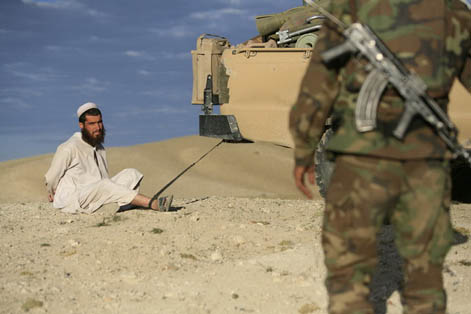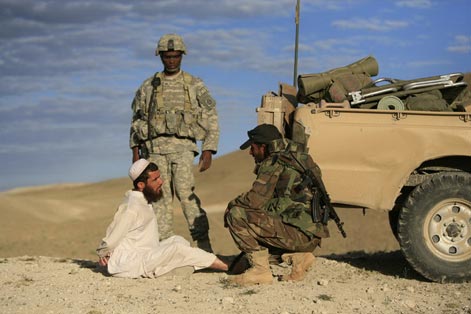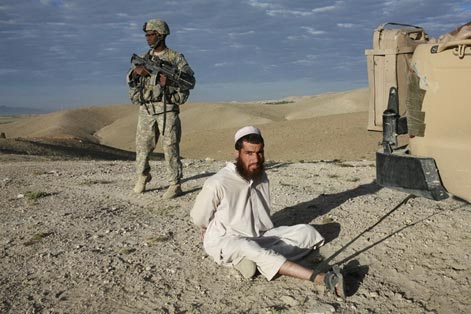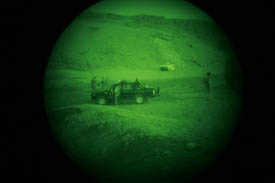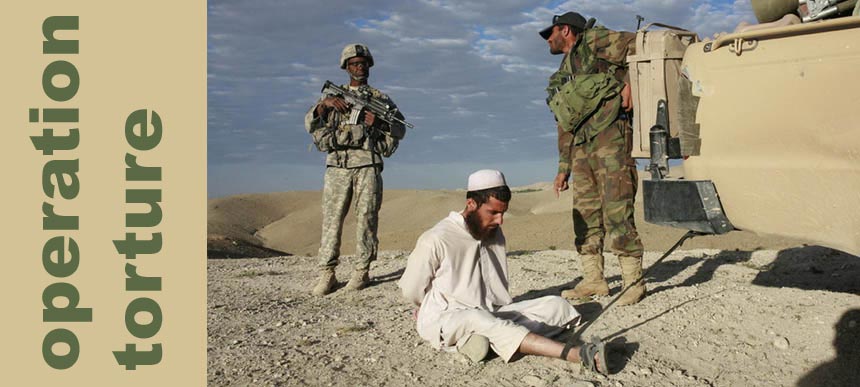
PHOTOGRAPHIE Karsten Schöne
The day when Sergeant Hill became an torturer. 24 hours of the US-operation "maiwand" in Afghanistan.
This war stinks of excrement. It stinks of sweat. Anyone who must get as close to it as the men of the 82d Parachute Infantry Regiment has his throat filled with filth. Their boots sink deep into it, their skin disappears deep under its crust. The heat of the Afghan desert burns down on the Americans. In the night they have surrounded the village of Niasollah, with armoured vehicles on all exit routes, machine guns on the hills. At the first light of day they now fan out into the alleyways of the mud settlement. The 27 US soldiers have hardly slept in two nights, they have not been able to wash themselves for two weeks. Their clothing sticks to them, their eyes are red with dust, they relieve themselves in the open field. Wherever they stop for a while the smell of their excrement spreads. They already have 30 months of Iraq behind them in the last three and a half years. Morale is miserable. Monday, 11 June, 6:30 a.m., 32 degrees. The hunt begins. This article records one day of the Afghanistan conflict. Twenty-four hours of a battle waged almost unnoticed by the world in the Hindu Kush. Tens of thousands of NATO soldiers and "Enduring Freedom" troops are trying to bring the country under their control; for six years, in vain. The Taleban are growing stronger in their old strongholds of the south and southeast, and giving the troops of the West the fiercest battles since the invasion. The self-appointed holy warriors now coordinate their attacks better and have more effective weaponry than four years ago. The mood in many provinces has turned against the troops of the international community: too much was promised, too little delivered. The number of suicide attacks rose from four in 2004 to 140 in 2006. The bloodiest so far took place the Sunday before last when 35 Afghan police trainers died in Kabul. Peace, once within reach, is now in the far distance again. The photographer Karsten Schöne and I have for three weeks accompanied American troops in this war. A close-up view. There is great nervousness this morning. Before they enter a village in this region of Afghanistan the paratroopers never know what sort of resistance they will encounter. "You have an hysterical nature," the noncommissioned officer in the armoured Humvee grumbles at the machine gunner. He heads towards the sun rising slowly over the horizon. In the streets of Niasollah, no residents can be seen yet. "Bullshit," says the machine gunner. "No, that's a real problem you have," his leader insists. "You always react in such a panic." Two informants of the Afghan secret service called the US unit by cell phone yesterday and reported that eight armed motorcyclists had come into the village from the mountains. The Taleban commander of Ghasni Province, Mullah Sharif Ohamed, was reportedly among them, with his entire command. A house to house search for them is to be conducted. The US paratroopers poke about randomly in the dust too often to now be willing to let this opportunity pass. "Fuck!" The machine gunner yells into the onboard radio. "Look, there in the riverbed! A guy in black rags. Why doesn't he swing his left arm while walking? Does he have a weapon?" Ten minutes later, a US soldier in another Humvee fires a warning shot when a man wants to flee on a motorcycle. In the valley below, Afghan police officers shoot at a second motorcyclist. He gets through their checkpoint. More and more radio messages crackle in the Humvees. As he sun falls back towards the horizon, the radio traffic rises to a wild staccato of calls and shouts. Once again the US forces in the Andar district of Ghasni Province are trying to defeat the Taleban. In the past, the rebels have returned repeatedly to the Pashtun region. Many of the leading commanders of the holy warriors come from there. Here is where they have their houses and their families are living. On the district borders, 1,200 American and 1,800 Afghan soldiers have set up posts and are now slowly pushing into the region. Village by village. For the first time in this war, the leadership of Operation "Maiwand" lies with the new Afghan National Army (ANA). A motley crew of an army that has only existed for five years. Officially, the US units serve only to support them. Thus far the results of the campaign have been modest, since the provincial governor announced it on TV two weeks before the start. Most of the Taleban have long ago fled to neighbouring regions. A success today would be that much more important for the record
When Sergeant James Hill climbs out of his Humvee at the break of dawn, the remaining personnel relax at almost the same moment. As they do every time. Hill is a very serious man, tall, taciturn, he cracks no jokes, he does not fool around, almost exactly the opposite of what the GIs otherwise value in their commanders. An uncommunicative man who gives short, crisp answers. Hill is leading the search of Niasollah on the American side. He leaves the overall leadership to the officers of the 90 Afghan security troops, as the script of the US top brass prescribes. Operation "Maiwand" is to be a training session for the ANA, which is to later fully assume the defence of the Kabul government. "What is the commander suggesting?" Hill continually asks the translator. "What should we do?" They should check a house on the edge of the village. To make a start, says the Afghan platoon leader Pacha Mair. They should knock on the sheet metal door. It is a long time until the door opens, too long for Pacha Mair's taste. He has received a new uniform from the Americans, a baseball cap, a new pickup, and twice a day asks them for ready-made meals. Chicken jambalaya. Hamburgers. Beef with onions and mashed potatoes. Without them his people would go hungry. The government in Kabul hardly concerns itself with its soldiers." What should we do?" Sergeant Hill asks again when they have found the only adult male resident in the house. He has his hands folded over his head, kneeling in front of the courtyard wall. The man in a white robe, with a black beard, is afraid, gets tangled up in contradictions. He says he is the brother of the woman who lives here. The woman meanwhile claims he is her husband. Pacha Mair yells at him. "What should we do?" Hill asks. Commander Mair understands that much English. "A liar," he says to Hill. From inside the house, the 12-year-old son of the prisoner watches as Mair ties the man's hands behind his back, as he forces him to the ground, a tension belt around his left leg. "What is the man saying?" Hill asks, standing guard in the background with his weapon. "What should we do?" Pacha Mair shackles the family father to the back of his pickup. If he does not tell the truth now, they will drive off. A death threat. After just a few meters this procedure would cost him in his life. The Afghan commander signals to Hill to sit at the steering wheel and start the engine. Hill hesitates briefly, the commander repeats his wish. Hill sits in the driver's seat, hesitates again, and finally turns the key in the ignition. For an endless two minutes he lets the engine run.
Things can happen quickly in war. Good and evil can reverse themselves. James Hill, until now covered by all international conventions, a fighter against terrorism, is suddenly a criminal according to international law. He has undertaken a mock execution. He is torturing. That too is expressly forbidden by the US Government. "Sometimes it works," he later says to justify the action. Sergeant Hill is quite casual, as if this torture technique during interrogation is part of the normal repertoire. It seems so normal to him that he lets photographer Karsten Schoene fully document the entire process. Hill says: "It works. I know of a 13-year-old boy who was recently threatened with being shot. And suddenly he gave a lot of useful information." This question is repeatedly forced on us during this three-week trip through the war: What is being defended in Afghanistan -the values of the West, freedom and human rights? Time and again we must see how those who are supposed to defend them destroy them. The man who was just threatened with having the flesh ripped from his back is released. There was not enough evidence against him. If he was not yet a Taleban, the chance has increased that he will now become one. It is just before 12 noon, 43 degrees Celsius, the suspicious motorcyclists have still not been found. The humming of the Shadow reconnaissance drone hovers over the village. Afghan soldiers repeatedly crane their necks but cannot discern the unmanned plane. In the distant headquarters of Operation "Maiwand," US officers sit at large screens and analyse black-and-white images of courtyards and mud roofs. Captain Aaron White, 29, normally a genuine bundle of energy, in the midday heat sinks into the shadows of a mud wall. "I could fall asleep," he tells his translator. "When I'm tired, I miss my wife the most. That sucks. Right then." White dozes a bit while ANA troops force their way into the homes of terrified families. All the soldiers come from the north, they are not Pashtuns but members of the tribe the Pashtun-dominated Taleban defeated. Thus far there has been little success at recruiting Pashtuns for the ANA. For Aaron White it is the army of the country; for the village inhabitants of Niasollah, the army of the enemy.
The period during which the US soldiers must fight in their government's wars is being constantly extended by the Pentagon. Tours are now 15 months (in the german Bundeswehr they are four months). Many of the men are burned out, the divorce rate is enormous, there are increasing drug and alcohol problems among returnees in the States. The US soldiers, often younger than 30, have usually had three tours of duty. Many have lost buddies. Many Humvees carry plastic bottles full of psychotropic drugs. When on home leave they visit friends who have left the service and are in psychiatric wards. They talk about it during quiet moments in the bivouacs. According to Army information, 18 per cent of all Iraq troops and 12 per cent of all Afghanistan veterans return home with serious mental disorders. Army psychiatrists fear the numbers will explode in 10 or 20 years: the Vietnam war showed that. The hunt continues. Motorcycle tracks lead from the village into a ravine. Aaron White runs after them, the only American, accompanied by his translator and eight ANA soldiers. On a rise they come under fire, the motorcyclists are shooting from a farmhouse. The soldiers perforate the mud house with Kalashnikovs. White takes cover only briefly. He has eaten dust and frustration for so long. Now, he says, he wants to know. He runs into the volleys almost as if liberated. He takes up the chase on foot, with rage he runs into the wide Afghanistan. He has a job to do, he says, and he wants to go home. The ANA storms the premises. "Forward! Forward!" he shouts to them. "Do you want to get your asses caught?" The inhabitants of the building seized sit dazed in front of the walls, small children and women. White notices their terror only from the corner of his eye, the motorcyclists have fled, a cloud of dust on the horizon. He must go on. He climbs into one of the two Humvees that have finally caught up with him in the difficult terrain. The other four Humvees have failed. Even in the sixth year of the war, the US Army is equipped completely inadequately. The farther White moves into the mountains, the more his technological superiority shrinks. The coalition forces in Afghanistan have material failures equal to those of the scrap arsenal of the Red Army. That is also why the war is dragging on so long, because Humvees do not drive and helicopters do not fly. The Daily Telegraph recently reported that half of the British Apache combat helicopters are not operational. |
|
|
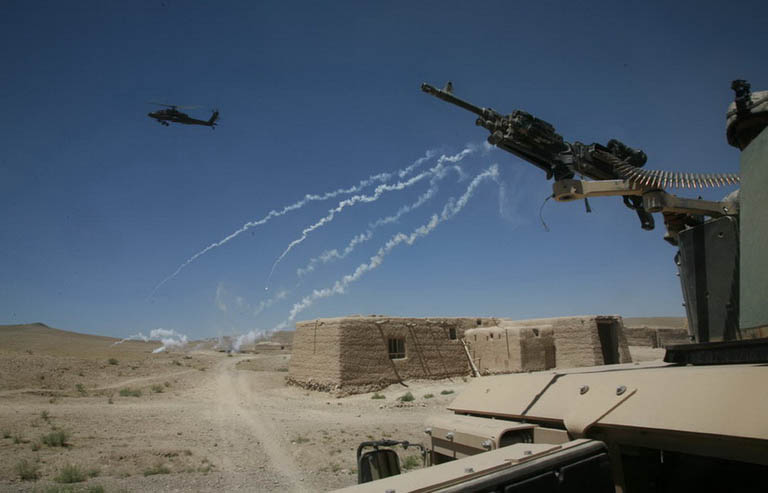 |
||
A Honda CG 124 and a blue Nami, engines still warm. They stand in the courtyard of an old, rail-thin man whose upper body is bent over by the force of the blows. Aaron White's Afghan partner, a secret serviceman code-named "Kuchi," is beating the old man. First with his fists, then with his rifle butt. He beats the whimpering man with it hard in the back, saying the man has told him stupid lies. Two US soldiers look on. Sergeant Joel Koppinger, 27, is one of them. He calmly waits for the results of the "interrogation." Koppinger is very impressed by "Kuchi's" personality. "One of the best Afghans I've met. A real Charles Bronson type." We have experienced other situations where Afghan security forces beat people and US officers tolerated it. "The Afghans have a different culture," Captain Brad McCoy of the Operation "Maiwand" command says, trying to generally justify the violence. "We are not here to change their culture." Whatever the case, the culture of the US Army is already changed: it is being brutalized. Two young men have walked into Aaron White's net. Surrounded by soldiers, one begins to cry, the other talks constantly. They first claim they live in the village, then say they come from Iran. Commander "Kuchi" does not hit them. No one hits them. In the end, all the Afghans, whether arrested or free, sit in the shadow of a house and let themselves be served tea and sweets by the mistreated old man. Two other motorcycle tracks lead from the village along a goat path. No weapon was found on those arrested, but that does not interest Captain White now. He has his catch. "You did a great job!" his superior praises him by radio in the evening. "Great work." www.focus.de/afghanistan-tagebuch
|
||
 |
 |
 |
 |
 |
 |
 |
 |
 |
 |
 |
 |
 |
 |
 |
 |
 |
 |
 |
 |
|||||||

PHOTOGRAPHIE |
